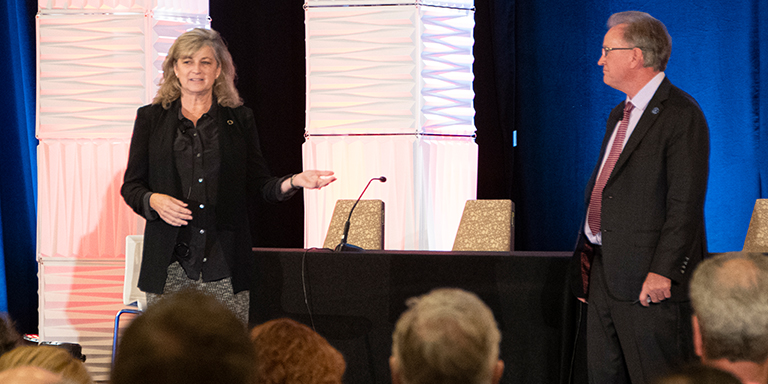Tish and Reeb Unveil New Model
SHARE:
A possible model of the Uniform CPA Examination, as envisioned by the CPA Evolution Task Force and then crafted by NASBA and AICPA leadership, was unveiled at the NASBA Annual Meeting, October 27-30 in Boston, MA. NASBA Vice Chair Laurie Tish and AICPA Chair Bill Reeb explained to the Annual Meeting audience that the model, which involves a large single core of material to be tested and then a candidate’s selection of one of three areas for additional testing, is similar to the testing model used for licensing professional engineers. To assist in determining what the core should contain, State Board representatives at the Regional Breakfast Meetings on October 29 were asked to prioritize subjects to potentially be included. Vice President Tish said the goal is to finalize the testing model in summer 2020: “We can’t let this take years and years.” Mr. Reeb added: “This will still be three-to-four years out from getting it through the states.”
In June 2019 the guiding principles for the CPA Evolution were presented at NASBA’s Regional Meetings and at AICPA forums. Ms. Tish reported that besides gathering comments at the Regional Meetings, over 2,000 comments from other individuals were submitted to the Task Force. Overall the principles were supported with the exception of one sentence which some thought targeted IT people. That sentence was deleted, Ms. Tish stated.
A different solution to the Uniform CPA Examination is “needed anyway,” as the body of knowledge now covered by the Exam has expanded significantly since the IRS code, accounting standards and auditing standards have multiplied. If more subjects were to be covered under the current Examination, they would have to covered with less depth. Vice Chair Tish said she believes the model being proposed is very flexible and adaptable, but would result in one CPA license.
Mr. Reeb noted that CPA firms are currently, and will be increasingly, providing services that require technologists. He asked: “If you are regulating something where huge numbers involved in that service are not CPAs – should you be the ones regulating them at all? We want to protect the public by providing oversight on services we provide.”
There are necessary steps to be taken in the regulatory environment, Ms. Tish reminded the audience. Education has to align with the core tested, but education “is not lagging behind us,” she observed. The larger schools are responding to demand, as students are moving to take technology courses, Mr. Reeb noted.







